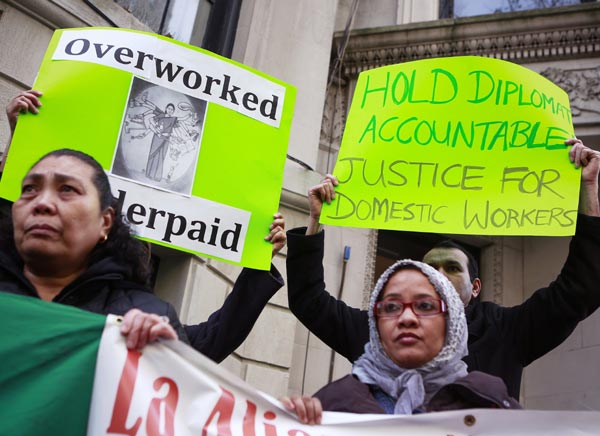India applies to UN to try to solve diplomat crisis
Updated: 2013-12-21 10:17
(Agencies)
|
||||||||
NEW YORK - India asked the United Nations on Friday to accredit a New York-based diplomat who was arrested for visa fraud, in an apparent attempt to defuse a crisis with the United States over her treatment by US authorities who strip searched her.
A UN spokesman said the organization had received an official request from New Delhi to accredit Devyani Khobragade as a member of India's permanent UN mission in what seemed to be a move to give her a stronger form of diplomatic immunity.
Khobragade's arrest has enraged India, which is demanding that all charges be dropped against her. Indian protesters ransacked a Domino's Pizza in a Mumbai suburb in anger at her detention this month for visa fraud and underpayment of her housekeeper.
She was strip searched at a US District Court building in downtown Manhattan and placed in a holding cell. As India's deputy consul general in New York, she only had limited diplomatic immunity from prosecution.
Indian media said the request to transfer her to the United Nations was aimed at ending the stand-off with the United States in the hopes that Khobragade's new diplomatic status could allow New Delhi to bring her home without facing charges.
Diplomatic sources said that broader immunity could make it harder to follow through on a prosecution against her.
One possible scenario to solve the crisis would be that she receives full diplomatic immunity in her UN post if the State Department approves her transfer. The US government would then ask for her immunity to be removed so she can face prosecution. Assuming India refused, the State Department could then take steps to have her removed from the country.
In a similar recent case, US Attorney Preet Bharara, who is prosecuting the envoy, charged dozens of Russian diplomats with healthcare fraud.
Unlike in Khobragade's case, there was no dispute that they were immune from prosecution, but Bharara acknowledged this month the State Department could seek to remove those who remained in the country.
US WANTS TO MOVE ON
The State Department said on Friday it wanted to move beyond the matter of the Indian diplomat.
"We certainly fully agree that it's important to preserve and protect our partnership. It's not just about diplomatic ties," State Department spokeswoman Jen Psaki told reporters, citing more than $90 billion in bilateral trade, close counterterrorism cooperation and engagement on a range of topics including Afghanistan.
"And we want to move beyond this, and I think we all recognise the importance of our long-term relationship," she added.
Asked whether a change in her diplomatic immunity status could prevent Khobragade from being arrested again or enable her to leave the United States, Psaki said, "I don't want to speculate on that."
She said any change in the diplomat's accreditation status would not provide a "clean slate from past charges."
Khobragade was arrested last week and released on $250,000 bail after giving up her passport and pleading not guilty to charges of visa fraud and making false statements about how much she paid her housekeeper, also an Indian. She faces a maximum of 15 years in prison if convicted of both counts.
US Secretary of State John Kerry expressed regret over the case in a phone call to India's national security adviser this week, but India is still demanding an apology. US prosecutors have defended the investigation against Khobragade and her treatment. Before this diplomatic blow-up, US-Indian relations were seen as cordial and improving.
Police in Mumbai said they were stepping up patrols of major US outlets including McDonald's after workers of the small Republican Party of India attacked the Domino's store. The group sent pictures to media organisations showing a broken glass door. No one was hurt in the attack.
The Indian diplomat's father threatened to begin a fast if US authorities press ahead with the case. In an unusual move, the United States has flown the family of the housekeeper, Sangeeta Richard, out of India.
"The fact is that (the) American authorities have behaved atrociously with an Indian diplomat. And obviously, America has to make good for its actions," said Manish Tiwari, India's minister for information and broadcasting.
"So therefore, I think it is a legitimate expectation, that if they have erred, and they have erred grievously in this matter, they should come forth and apologise."
Protesters also gathered at the US consulate in Hyderabad for a second day on Friday, shouting slogans, local media said.
In New York, a few dozen protesters including several domestic workers from South and Southeast Asia gathered outside India's consulate, chanting slogans and waving posters demanding that Khobragade's diplomatic immunity be waived.
"Passports revoked, slave wages, restricted communication - this constitutes trafficking workers," said Leah Obias, an organiser with the migrant-workers rights group Damayan. "There are diplomats trafficking workers all over the city and we demand justice."
US Attorney Bharara said on Wednesday Richard's family had been brought to the United States after legal efforts had begun in India "to silence her, and attempts were made to compel her to return to India."
Furious that one of its foreign service officers had been handcuffed and treated like "a common criminal," India this week removed security barriers outside the US embassy in New Delhi and withdrew some privileges from US diplomats.
The reaction in India was even more intense because none of the political parties preparing for next year's general election wanted to be seen as weak against a superpower.
Politicians, including the leaders of the two main parties, refused to meet a delegation of visiting US lawmakers.
"Because of the election, they will try to outdo each other," said Neerja Chowdhury, a political analyst and a former political editor of Indian Express newspaper.
"They don't want to be seen as weak on the issue when the mood in the country is one of huge anger about this."
The party that runs India's most populous state, Uttar Pradesh, urged Khobragade to stand for parliament, highlighting how public outrage has turned the case into a battleground for votes.

 Migrating cranes at Israel's Hula Lake
Migrating cranes at Israel's Hula Lake
 Reviving the 'river pig'
Reviving the 'river pig'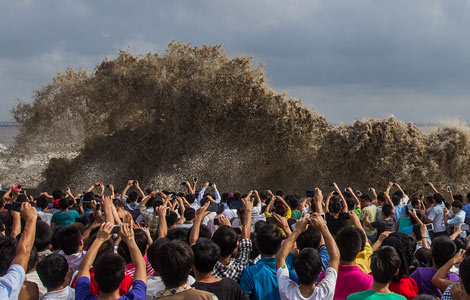
 Smiles give way to dials
Smiles give way to dials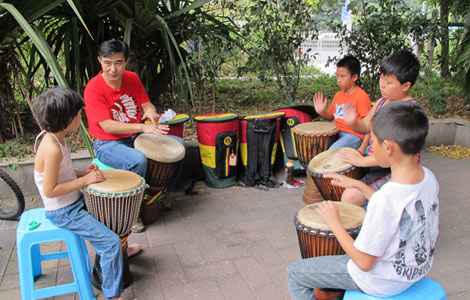
 Learning to an African beat
Learning to an African beat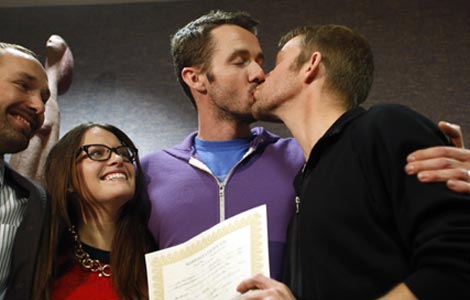
 US judge strikes down Utah's gay marriage ban
US judge strikes down Utah's gay marriage ban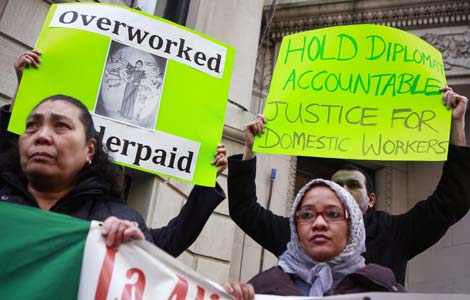
 India applies to UN to try to solve diplomat crisis
India applies to UN to try to solve diplomat crisis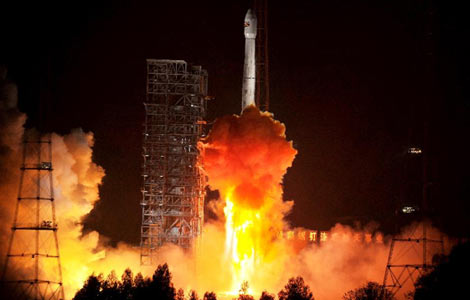
 China launches communications satellite for Bolivia
China launches communications satellite for Bolivia
 Lonely polar bear in the Arctic Ocean
Lonely polar bear in the Arctic Ocean
Most Viewed
Editor's Picks

|

|

|

|

|

|
Today's Top News
Castro urges US to respect differences with Cuba
Student wounded in school shooting dies
US aircraft hit by gunfire in S. Sudan
Memorials mark Lockerbie attack
China's moon rover works stably
H5N2 outbreaks in northern province
Freed Russian oil tycoon lands in Germany
US needs check data gathering
US Weekly

|

|
